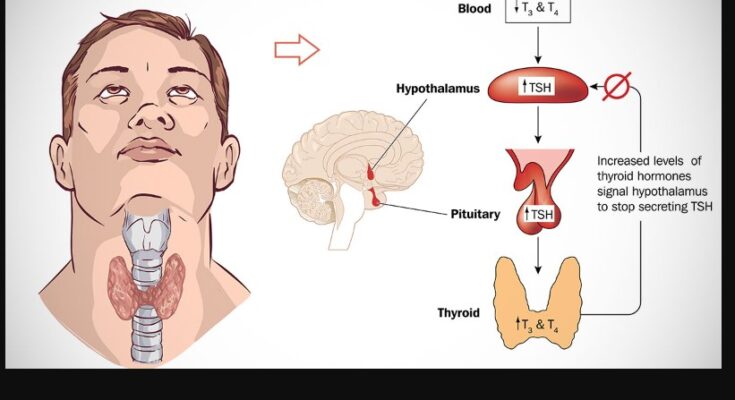Welcome to our guide on TSH levels!
If you’ve ever wondered what your thyroid-stimulating hormone levels mean for your health, you’re in the right place.
Today, we’ll explore the world of TSH, from understanding what it is to deciphering high and low levels.
Get ready to demystify the secrets of your thyroid gland!
What is TSH (Thyroid Stimulating Hormone)?
TSH, or Thyroid Stimulating Hormone, is a crucial regulator in the endocrine system. The pituitary gland produces it and plays a vital role in controlling thyroid function. When TSH levels are out of balance, it can indicate underlying issues with the thyroid gland.
This hormone essentially tells the thyroid how much hormone to produce – think of it as a messenger that keeps everything in check. Monitoring TSH levels through blood tests helps healthcare providers assess thyroid health and diagnose conditions like hypothyroidism or hyperthyroidism.
In essence, TSH serves as a communication link between the brain and the thyroid, ensuring that your metabolism stays on track. Understanding this small but mighty hormone is key to maintaining overall well-being and keeping your body’s internal mechanisms running smoothly.
Understanding the Thyroid Gland
The thyroid gland, a small butterfly-shaped organ located in the neck, plays a crucial role in regulating metabolism and energy levels. It produces hormones that impact almost every cell in the body. The primary hormone produced by the thyroid is thyroxine (T4), which gets converted into triiodothyronine (T3) – the active form of thyroid hormone.
Thyroid function is controlled by TSH, or Thyroid-Stimulating Hormone, released by the pituitary gland. High TSH levels indicate an underactive thyroid or hypothyroidism. Conversely, low TSH levels suggest an overactive thyroid or hyperthyroidism.
Maintaining a healthy balance of these hormones is essential for overall well-being. Any disruption in this delicate balance can lead to various health issues ranging from fatigue and weight gain with high TSH levels to anxiety and weight loss with low TSH levels.
Understanding how your thyroid works can empower you to take control of your health and seek appropriate treatment if needed.
Interpreting High TSH Levels
Have you ever wondered what high TSH levels mean for your health? Let’s dig into it a bit. When your thyroid-stimulating hormone (TSH) levels are elevated, it could indicate an underactive thyroid gland, also known as hypothyroidism. This means that your body is signalling the thyroid to produce more hormones because there isn’t enough in circulation.
High TSH levels can lead to symptoms like fatigue, weight gain, dry skin, and feeling cold all the time. It’s essential to get these levels checked by a healthcare provider to determine the underlying cause and appropriate treatment. Remember that high TSH doesn’t necessarily mean something severe, but getting proper medical advice is crucial to managing your health effectively.
Understanding how high TSH levels affect the body can help you take control of your health and make informed decisions about any necessary treatment options.
Possible Causes of High TSH Levels
Several factors can contribute to high TSH levels. One common cause is an underactive thyroid gland, also known as hypothyroidism. This occurs when the thyroid doesn’t produce enough hormones, triggering the pituitary gland to release more TSH to try to stimulate the thyroid.
Another potential culprit for elevated TSH levels is iodine deficiency. Iodine is crucial for the production of thyroid hormones, so a lack of this essential mineral can lead to increased TSH secretion.
Certain medications like lithium or amiodarone may also contribute to higher TSH levels by interfering with normal thyroid function. Additionally, conditions such as inflammation of the thyroid gland (thyroiditis) or pituitary disorders can disrupt the balance of TSH in the body.
Stress and chronic illness are other possible causes of low TSH levels. If you suspect your TSH levels are out of range, consult with a healthcare provider for proper evaluation and treatment.
Risks and Complications of High TSH Levels
High levels of TSH in the body can lead to various risks and complications that may impact overall health. One significant risk is the potential development of hypothyroidism, a condition where the thyroid gland does not produce enough hormones for essential bodily functions. This can cause symptoms like fatigue, weight gain, and depression.
In addition, high TSH levels can also be indicative of an underlying thyroid disorder such as Hashimoto’s disease or thyroiditis. If left untreated, these conditions can result in long-term health issues and affect quality of life. Furthermore, elevated TSH levels may increase the risk of heart problems such as high cholesterol and heart disease.
It is crucial to monitor TSH levels regularly with medical guidance to avoid any serious complications that may arise from persistently high levels. Seeking proper treatment and management strategies is essential to maintaining optimal thyroid function and overall well-being.
Treating High TSH Levels
The approach to treating high TSH levels can vary depending on the underlying cause. In cases where hypothyroidism is diagnosed, medication such as levothyroxine may be prescribed to help regulate thyroid hormone levels. It’s essential to follow your healthcare provider’s recommendations and attend regular follow-up appointments to monitor progress.
In addition to medication, lifestyle changes like maintaining a healthy diet and regular exercise can also support thyroid health. Stress management techniques such as yoga or meditation may help reduce cortisol levels, which can impact thyroid function. Some individuals may benefit from dietary supplements like selenium or iodine, but it’s crucial not to self-prescribe these without professional guidance.
Remember that treating high TSH levels is a collaborative effort between you and your healthcare team. Open communication, adherence to treatment plans, and proactive self-care are key in managing this condition effectively for optimal health outcomes.
Interpreting Low TSH Levels
Low TSH levels can indicate an overactive thyroid or hyperthyroidism, where the thyroid gland produces too much thyroid hormone. This can lead to symptoms such as rapid heartbeat, weight loss, and anxiety. It’s essential to consult a healthcare professional for proper diagnosis and treatment if you suspect low TSH levels.
Potential causes of low TSH levels include Graves’ disease, toxic nodular goiter, or excessive intake of thyroid medication. Monitoring TSH levels regularly is crucial in managing thyroid conditions effectively.
Untreated low TSH levels may cause complications, including heart problems, brittle bones, and fertility issues. Maintaining a balanced thyroid function is essential for overall health and well-being.
If you experience symptoms like fatigue, tremors, or unexplained weight loss along with low TSH levels on your lab results, don’t hesitate to seek medical advice promptly. Your healthcare provider can recommend appropriate interventions to help regulate your thyroid function efficiently.
Risks and Complications of Low TSH Levels
Having low TSH levels can lead to various risks and complications that should not be overlooked. One of the primary concerns is an underactive thyroid, also known as hypothyroidism. This condition can result in symptoms like fatigue, weight gain, and depression.
Low TSH levels may also indicate a problem with the pituitary gland or hypothalamus. These issues can disrupt the delicate balance of hormone production in your body, leading to further health complications if left untreated.
Inadequate levels of TSH can impact fertility in both men and women. It may affect menstrual regularity in women and sperm production in men. Seeking medical advice is crucial if you suspect low TSH levels are affecting your reproductive health.
Furthermore, having low TSH levels could increase the risk of developing heart problems such as irregular heartbeat or even heart failure over time. Monitoring your thyroid function regularly is essential for maintaining overall health and well-being.
Conclusion:
Understanding TSH levels is crucial for monitoring thyroid health. Whether your TSH levels are high or low, it’s essential to work closely with healthcare professionals to determine the underlying causes and appropriate treatment plan.
Remember, maintaining optimal TSH levels is key to overall well-being and a healthy thyroid function.
Stay informed, stay proactive, and prioritize your thyroid health for a happier and healthier life ahead.




